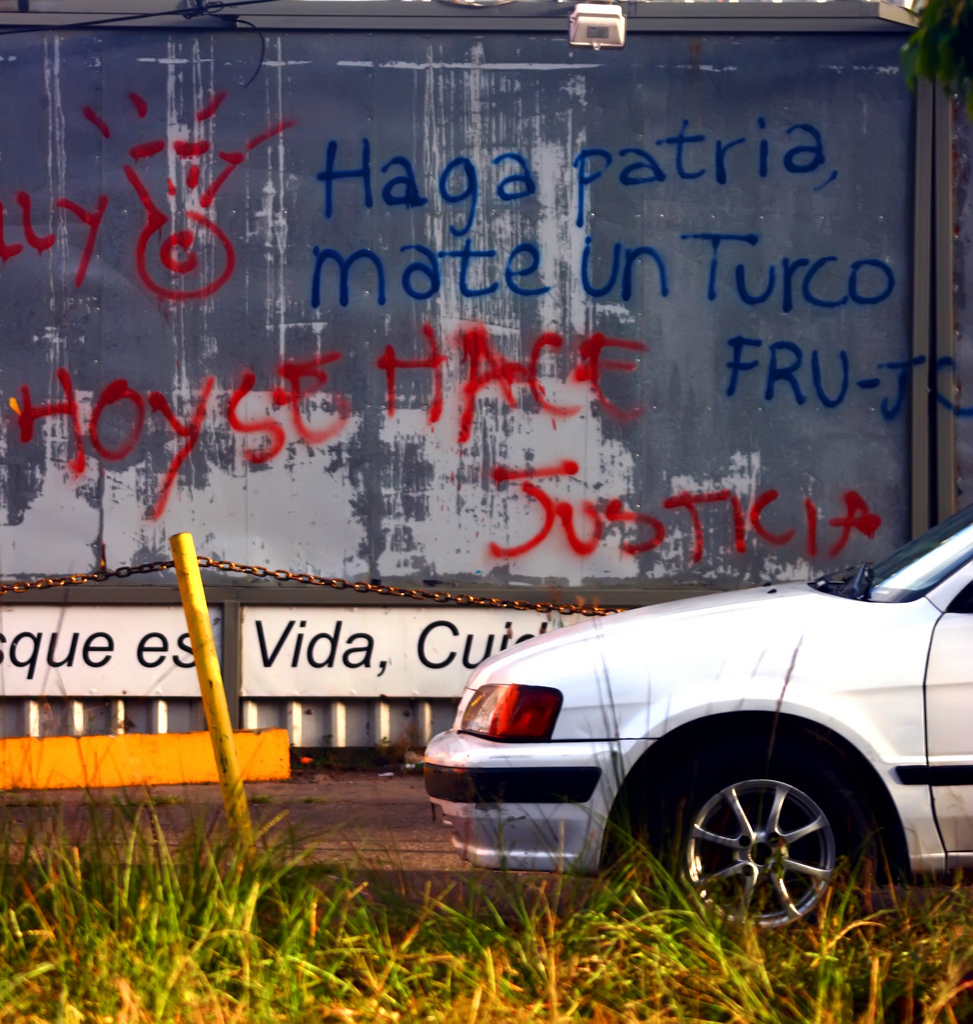
I chose this picture, which says ”Haga patria, mate un Turco fruco” translating to ”Be a good Honduran, kill a Turco today” because I was struck by the aggression towards Arab-Hondurans, which I have not heard much about to this degree. A ”Turco” refers to someone of Arab descent, especially pertaining to countries such as Palestine, Lebanon, and Syria. Despite not being from Turkey, due to their Ottoman Empire passports, they were ridiculed at the fall of the Ottoman empire by Honduran immigration and labeled as ”Turks” or ”Turcos” in Spanish. This Arab migration to Honduras continued for a few decades, from the end of the 19th century to the early 20th century.
Being a Honduran of Palestinian descent, I have known about stereotypes, which are largely true, about Arab-Hondurans being of higher-status and class. Palestinian-Hondurans comprise much of the ruling class in Honduras, dominating sectors such as business, energy, media, banking, and creating jobs in industrialization. There are not many up to date statistics; however, in terms of proportion, Honduras has the highest amount of Palestinians in the Western Hemisphere.
Palestinians in Honduras came to be some of the wealthiest individuals and communities in Honduras by taking the opportunity of economic and political policies that would aim to modernize Honduras beginning in 1949 to create their consolidation. Along the way, Palestinians helped other Palestinians set-up shops, businesses, and mutual-aid-esque funds to help other Palestinians make their journeys to Honduras.
The first known retaliation against Arab-Hondurans was in 1933 when General Tiburcio Carías arose to the presidency in 1933, through coalition-building of the General’s supporters and Arabs descendants, causing his opponents to retaliate against the Arabs. Throughout the years, more and more Arabs joined the political sphere of Honduras, more notably Carlos Flores Facusse being elected as President of Honduras in 1998, with his mother being born in Bethlehem, Palestine.
However, after the 2009 coup d’état of President Manuel Zelaya, people were enraged with the business sector, who instigated the removal of Zelaya due to their beneficence of this corrupt system. Because Arab-Hondurans comprised most of the business sector, a xenophobic campaign was unleashed against them. Many of the people who used social media to support Honduran President Juan Hernández, were Arab. With this heightened dissatisfaction towards the business class of Honduras and even the recent scandal of President Juan Hernández, it would be unsurprising to see more xenophobia towards Arab-Hondurans.
Works Cited:
Kawas, Gina. “Palestinians in HONDURAS: From a THRIVING SOCIO-ECONOMIC Trajectory to a Potential Rejection,” August 5, 2015. https://clacsnyublog.com/2015/08/05/palestinians-in-honduras-from-a-thriving-socio-economic-trajectory-to-a-potential-rejection/.
Rosas, Diana. “Honduras: a Country with a Major History of Arab Immigration in Latin America.” Países Pequeños, April 18, 2020. https://paisespequenos.wordpress.com/2020/04/18/honduras-a-country-with-a-major-history-of-arab-immigration-in-latin-america/.
